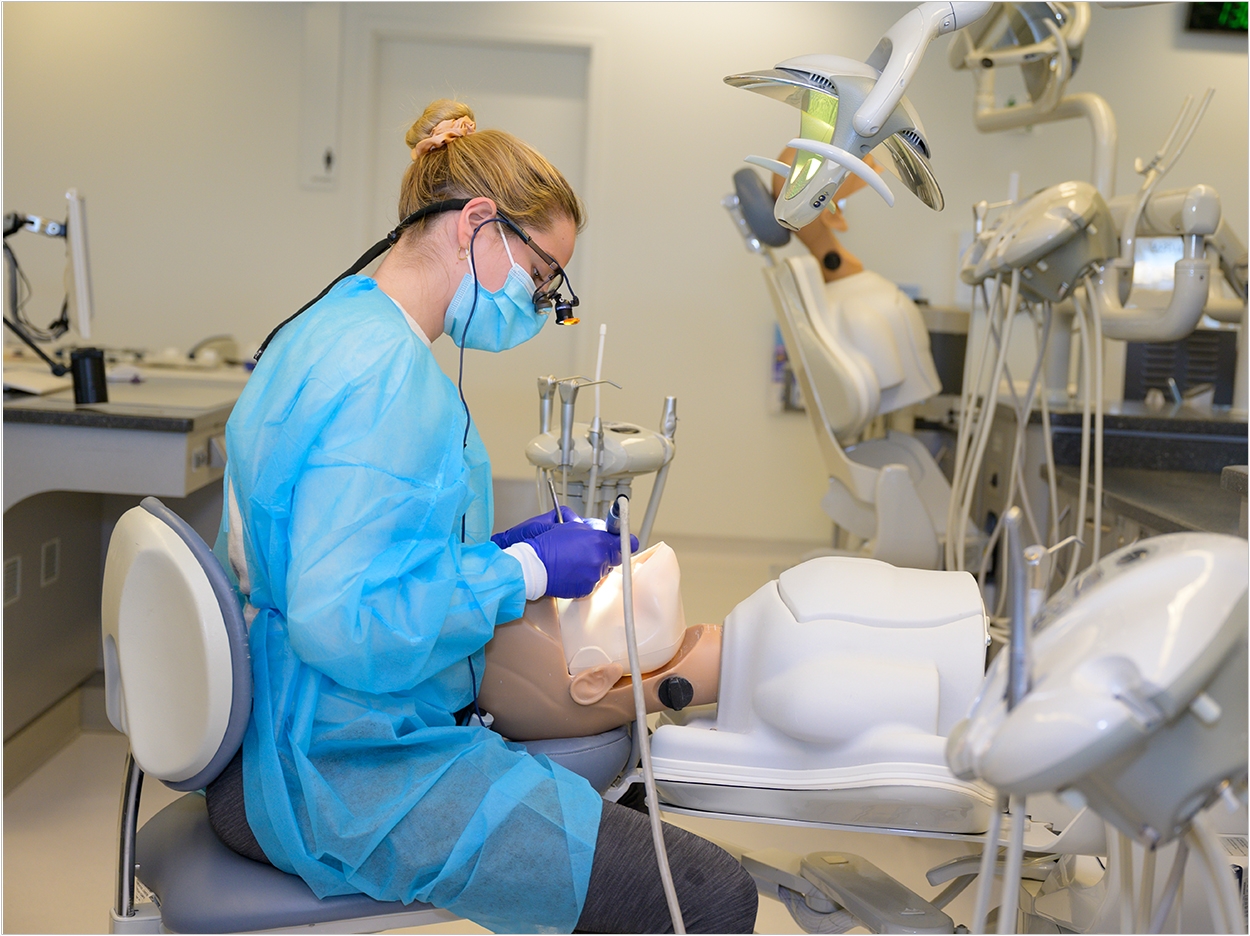
Due to San Francisco’s shelter in place orders, the Arthur A. Dugoni School of Dentistry took a new approach for its Spring Quarter and in preparing its students for their licensure exams.
Routine dental care wasn’t allowed due to the pandemic, so graduating students wouldn’t have anyone to treat during their exams. The school’s leadership, then, worked closely with the Western Regional Examining Board (WREB) to develop alternatives.
Using a simulation-based exam, the validated process could move forward without patients. The exam also could be administered over one weekend instead of two.
The Dugoni School’s Building Operations and Clinical Operations teams prepared the dental clinics for the new approach, turning 72 operatories into simulation stations by removing headrests and installing dental manikins to serve as patient simulators.
Students and test takers then could authentically simulate the patient care experience using exactly the same instrumentation and ergonomics used for direct patient care, the school said.
Along with screening, entry, and flow safety measures, the school also used a dental laboratory outfitted with simulation stations and ensured that students would have enough physical distance between them during the exam.
The new approach required a change in a California state regulation around licensure exams, so the Dugoni School worked with partner organizations to advocate for the change. The California Dental Association, American Student Dental Association, and Dugoni and other California dental schools communicated the need for this modified exam to state leaders.
This advocacy supported licensure for the graduating students across the state and, ultimately, the nation, the school said. Equally as important, it continued, this advocacy allowed for these practitioners to enter practice and begin addressing the pent-up need for oral healthcare in the state after the prolonged shelter in place.
The Dental Board of California and the California Department of Consumer Affairs ultimately approved the non-patient-based exam and allowed it to move forward.
Feedback about the simulated exam from students and examiners has been positive, Dugoni said. The school’s clinical research had a debriefing with the WREB chief examiner, who was very complimentary about how well prepared the students were for this new exam format, Dugoni said.
“It was definitely nerve wracking being one of the first classes to take the manikin-based exam, but the school did a great job of preparing us the week beforehand,” said Leah Life of the DDS class of 2020.
“I’m grateful we had the opportunity to take it so soon after the Dental Board of California approved the manikin-based exam. I think it was a great test of our abilities and have faith our class did great!” said Life.
“Being the first class in the nation to take an entirely manikin-based licensure examination felt like history in the making,” said Letitia Edwards, another member of the class of 2020.
“Organized dentistry has been advocating for years to remove the patient-based components of the licensing exams in lieu of a manikin-based portion, and we’ve finally done it! I hope that this will continue for years to come,” said Edwards.
“I can’t thank the Dugoni School family, WREB examiners, and staff members enough for helping us in our journey to become licensed dentists. Everyone truly came together to ensure that the exam ran smoothly, without any hiccups, and that we could perform our best even under these turbulent circumstances,” said Edwards.
“I’m so proud of the entire family here at the University of the Pacific Dugoni School of Dentistry and all of our partners, especially the California Dental Association, who helped make this simulation-based licensure exam a reality,” said Dr. Nader A. Nadershahi, dean of the Dugoni School.
“This creative approach ensured that our graduating students could finish up their programs and pass this key milestone before moving to the next phase of their career, instead of having to wait many more months or longer to take the WREB exam,” Nadershahi said.
“While the pandemic has caused much disruption, it has also allowed us to pursue innovative approaches to dental education and licensure. I am confident that these graduates will help shape an even stronger future for our great profession,” he said.
Related Articles
Virtual Dental Clinic Launches at University of Washington
SLU Names Scholarships After Dentist and Civil Rights Pioneer
Students Win 2020 SCADA Awards












